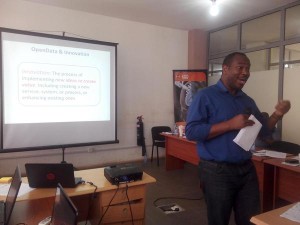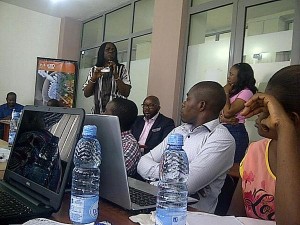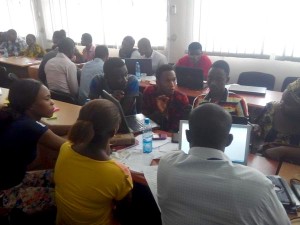‘Where has this been!?’ Open Data Day in Benin, Nigeria.
In the city of Benin, located in the Edo State of Nigeria, the 21st of February was a memorable day. At the occasion of the worldwide Open Data Day, the first ever open data hackathon of the city took place, alongside another event called Open Data party .
This event, organised by SabiHub, was supported by Open Knowledge, the Ministry of Agriculture and Edo Open Data. The event focused on the agriculture sector, looking at the challenges and engaging citizens to imagine data driven solutions using the available Agriculture datasets from the state’s open data portal. 50 participants were expected but over 90 participants joined us: Civil society organisations, NGOs, journalism Students, government officials and other open data enthusiasts.
As we kickstarted the 6-hour long event, the place was buzzing with excitement. 6 facilitators guided the participants through an adventure about data around the world, wrangling and making sense of numbers. Participants welcomed the knowledge with frowns, questions, excitement, and ‘where has this been’s!
Lunch and tea break were welcomed to calm the minds. We then introduced them to a list of challenges the agriculture sector was facing, and asked them to wrangle and create data-driven solutions with those challenges in mind. They broke out into groups and hacked for 3 hours.
What was the outcome? Many ideas sprung up, from bridging the information gap between famers and the market, to easier location of agricultural facilities and more. A common challenge in the groups was the lack of data skills to solve the problems idendified! Read more at #ODDBenin15
Although Edo state is the first government in Nigeria to launch an open data portal since 2013, low data literacy among potential reusers is still a problem that keeps the initiative from reaching its full potential. The economic benefits of Open data has yet to be harnessed. The Edo State joined forces with organizations like BudgIT, Connected development in spreading the skills necessary to visualize government budget, track government spending and train civil society organisations and journalists while also evangelizing the use of data in schools.
With a population of over 170 millions, more has to be done to reach out to CSOs, entrepreneurs, NGOs, journalists. This work will be done thanks to School of Data and other organizations who continuously support the campaign for data literacy, active citizen engagement, fact-driven stories and advocacy, job creation and a lot more. We are not where we want to be, but things have definitely improved in the past years. I’m optimistic that the 2015 School of Data fellowship will drive us steps ahead towards a more literate and informed society.




